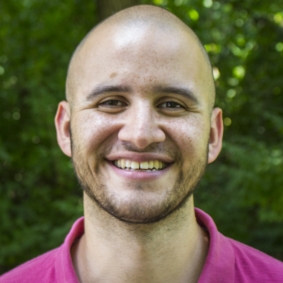Knauss legislative fellowships in Congress help build careers — and they're fun and educational. See our video and fact sheet for details.
Sergio García Mejía

Fellowship Institution:
Bureau of Ocean Energy ManagementStart Year:
2022Sergio García Mejía is an Ocean Energy Environmental Science & Policy Fellow at the Bureau of Ocean Energy Management (BOEM), Office of Environmental Programs. Sergio is also a PhD student of the Civil & Environmental Engineering department in the Center for Disaster Resilience at the University of Maryland (UMD). His research explores the intersections between infrastructure resilience, household recovery, disaster aid, and disaster management, explicitly concerning their manifestations in multi-hazard-prone locations and vulnerable populations. Sergio graduated from Universidad de San Carlos de Guatemala with a BA in Civil Engineering. He then came to the US with the Fulbright Foreign Student Program to obtain an MSc in Civil & Environmental Engineering at UMD. Sergio has significant experience working in municipal and non-profit organizations in rural and semi-rural environments in Guatemala. In his free time, Sergio enjoys rock climbing and playing the saxophone.
Call for Symposium Presenters and Authors
The Chesapeake Rising: Innovative Law and Policy Solutions for Climate Adaptation in Coastal Communities symposium will explore key legal and policy considerations that affect climate adaptation strategies. It provides a unique opportunity for upper-level law students and early-career lawyers to present and publish their legal scholarship.
Program Announcements
-
-
Maryland Sea Grant has program development funds for start-up efforts, graduate student research, or strategic support for emerging areas of research. Apply here.
News and Blogs
Video Gallery
Sea Grant Film Explores a Diminishing Smithville
Smithville is a community on Maryland’s Eastern Shore, on the edge of the Blackwater National Wildlife Refuge. A century ago, Smithville had more than 100 residents. Today, it has four, in two homes: an elderly couple, and one elderly woman and her son, who cares for her.
Featured Fellow
Featured Research Project
Developing a habitat model for mysids, an important link in Chesapeake Bay food webs
Mysids are important mesozooplankton prey for many species of fish in Chesapeake Bay and are an important link in transferring energy from lower to upper trophic levels. Mysids also serve as biological vectors for benthic-pelagic coupling due to their diel vertical migration and omnivorous prey-switching behavior, which makes mysids important regulators of food web architecture. Despite their central role in coastal food webs, surprisingly little is known about mysid ecology and dynamics in Chesapeake Bay.
The Blue Crab: Callinectes Sapidus
An essential resource for researchers, students, and managers. Get your copy today!


©2025 Maryland Sea Grant. All rights reserved.
5825 University Research Court, Suite 1350 | College Park, MD 20740
Phone: (301) 405-7500 | Fax: (301) 314-5780 | Contact Us



